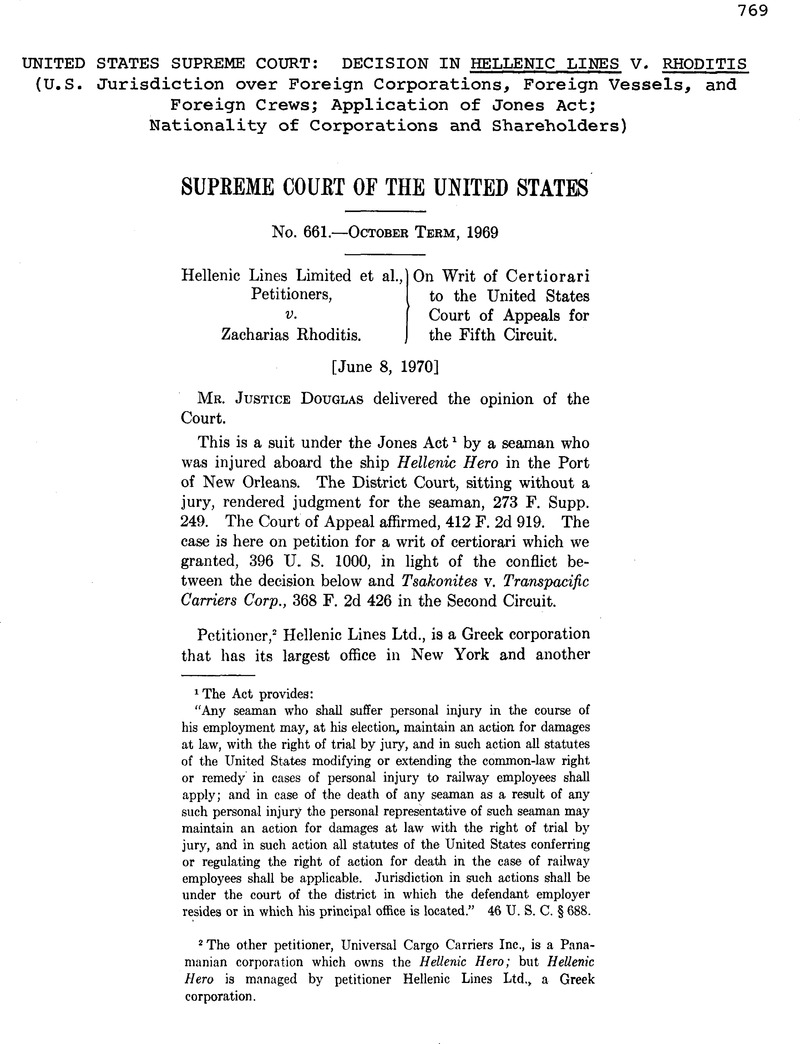No CrossRef data available.
Article contents
United States Supreme Court: Decision in Hellenic Lines V. Rhoditis (U.S. Jurisdiction over Foreign Corporations, Foreign Vessels, and Foreign Crews; Application of Jones Act; Nationality of Corporations and Shareholders)
Published online by Cambridge University Press: 20 March 2017
Abstract

- Type
- Judicial and Similar Proceedings
- Information
- Copyright
- Copyright © American Society of International Law 1970
References
1 The Act provides:
“Any seaman who shall suffer personal injury in the course of his employment may, at his election, maintain an action for damages at law, with the right of trial by jury, and in such action all statutes of the United States modifying or extending the common-law right or remedy in cases of personal injury to railway employees shall apply; and in case of the death of any seaman as a result of any such personal injury the personal representative of such seaman may maintain an action for damages at law with the right of trial by jury, and in such action all statutes of the United States conferring or regulating the right of action for death in the case of railway employees shall be applicable. Jurisdiction in such actions shall be under the court of the district in which the defendant employer resides or in which his principal office is located.” 46 U. S. C. § 688.
2 The other petitioner, Universal Cargo Carriers Inc., is a Panamanian corporation which owns the Hellenic Hero; but Hellenic Hero is managed by petitioner Hellenic Lines Ltd., a Greek corporation.
3 Pericles owns in excess of 95% of the stock of both petitioners.
4 Judge Medina, speaking for the Court of Appeals for the Second Circuit, correctly stated the problem in the following words:
“. . . the decisional process of arriving at a conclusion on the subject of the application of the Jones Act involves the ascertainment of the facts or groups of facts which constitute contacts between the transaction involved in the case and the United States, and then deciding whether or not they are substantial. Thus each factor is to be ‘weighed’ and ‘evaluated’ only to the end that, after each factor has been given consideration, a rational and satisfactory conclusion may be arrived at on the question of whether all the factors present add up to the necessary substantiality. Moreover, each factor, or contact, or group of facts must be tested in the light of the underlying objective, which is to effectuate the liberal purposes of the Jones Act. Bartholomew v. Universe Tankships, Inc., 263 F. 2d 437, 441.
5 “The Bill of Rights is a futile authority for the alien seeking admission for the first time to these shores. But once an alien lawfully enters and resides in this country he becomes invested with the rights guaranteed by the Constitution to all people within our borders. Such rights include those protected by the First .and the Fifth Amendments and by the due process clause of the Fourteenth Amendment. None of these provisions acknowledges any distinction between citizens and resident aliens. They extend their inalienable privileges to all ‘persons’ and guard against any encroachment on those rights by federal or state authority.” Bridges v. Wixon, 326 U. S. 135, 161 (concurring opinion).




